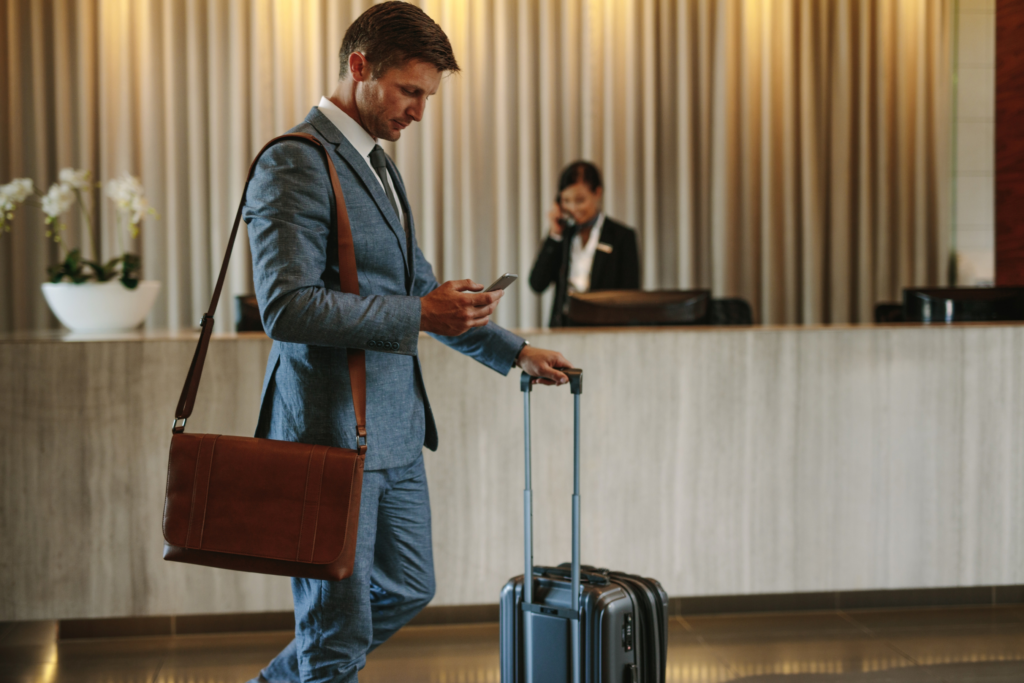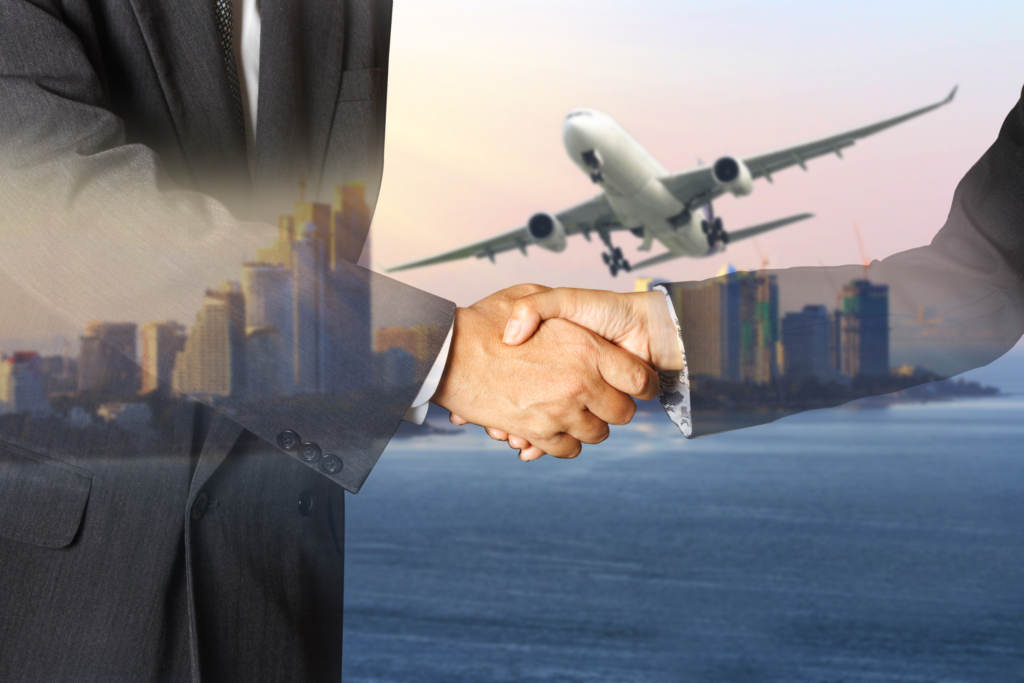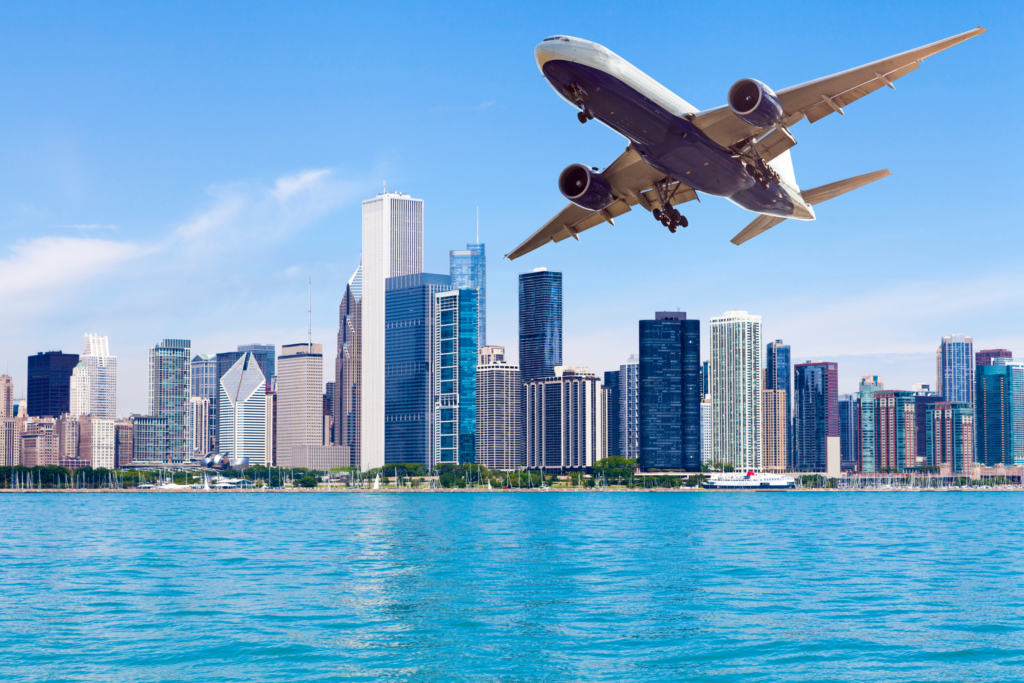Business travel is an integral part of many professionals’ lives. Whether it’s meeting clients, attending conferences, or closing deals, travel plays a crucial role in expanding networks and fostering growth. But how can professionals make the most out of their business trips? What are the best practices and insider tips to optimize the travel experience?
In this comprehensive guide, we will dive deep into the realm of business travel, offering valuable advice and insights to help professionals navigate their journeys with ease and efficiency. From essential tools and planning techniques to staying productive and maintaining a healthy lifestyle on the road, we’ve got you covered. So, if you’re ready to unlock the secrets of successful business travel, join us on this enlightening journey.

Key Takeaways:
- Discover essential tools and technology to enhance your business travel experience
- Master the art of planning and booking business trips efficiently
- Maximize comfort and productivity during business flights
- Stay organized and efficient throughout your business trips
- Maintain a healthy lifestyle while traveling for business
Essential Business Travel Tools for Professionals
When it comes to business travel, professionals need reliable tools to stay organized and productive on the go. Whether it’s managing travel plans, staying connected with colleagues, or maximizing productivity, having the right tools can make all the difference. Here are some essential business travel tools that every professional should consider:
1. Travel Planning Apps and Websites
Planning a business trip involves numerous details, from booking flights and accommodations to organizing itineraries. Utilizing travel planning apps and websites can streamline this process and ensure a smooth travel experience. Some popular options include:
- TripIt: This app allows you to consolidate all your travel plans, including flight details, hotel reservations, and car rentals, in one place.
- Kayak: With its powerful search engine, Kayak helps you find the best deals on flights, hotels, and rental cars.
- Expedia: Expedia offers a comprehensive platform for booking flights, hotels, and vacation packages, making it easy to manage all your travel arrangements.
2. Productivity and Communication Tools
Staying productive and connected while traveling is essential for professionals. These tools can help you stay organized and communicate effectively:
- Microsoft Office 365: With cloud-based access to tools like Word, Excel, and Outlook, Office 365 allows you to work on documents, check emails, and manage your calendar from anywhere.
- Slack: This team communication platform enables real-time messaging, file sharing, and collaboration, keeping you connected with your colleagues no matter where you are.
- Trello: Trello is a project management tool that helps you organize tasks, set deadlines, and track progress, ensuring that nothing falls through the cracks during your business travels.
3. Mobile Hotspots and Power Banks
Reliable internet access is crucial for business travelers, especially when working from remote locations or while in transit. Consider investing in a portable mobile hotspot to ensure a stable internet connection wherever you go. Additionally, don’t forget a power bank to keep your devices charged on the move.
4. Noise-Canceling Headphones
Long flights and busy airports can be noisy and distracting, making it difficult to focus on work or relax. Noise-canceling headphones can help block out the surrounding noise, allowing you to concentrate on your tasks or unwind during your journey.
5. Travel Expense Tracker Apps
To manage your travel expenses efficiently, consider using travel expense tracker apps that allow you to capture receipts, track expenses, and generate expense reports. This can save you time and help ensure accurate reimbursement for your business travel expenses.
In a world where efficiency is key, having the right business travel tools can make all the difference in maintaining productivity and organization throughout your trips.
| Tool | Key Features |
|---|---|
| TripIt | Consolidates travel plans in one place |
| Kayak | Finds the best deals on flights, hotels, and rental cars |
| Expedia | Comprehensive platform for booking flights, hotels, and vacation packages |
| Microsoft Office 365 | Cloud-based access to productivity tools like Word, Excel, and Outlook |
| Slack | Real-time messaging and collaboration platform |
| Trello | Project management tool for organizing tasks and deadlines |
Investing in these essential business travel tools can enhance your efficiency, productivity, and overall travel experience as a professional. With the right tools at your disposal, you can navigate the challenges of business travel with ease, ensuring smooth journeys and successful trips.
Planning and Booking Business Travel – A Step-by-Step Guide
When it comes to planning and booking business travel, professionals need a structured approach to ensure a smooth and efficient experience. From researching destinations to managing travel expenses, every step plays a crucial role in optimizing the journey. This step-by-step guide will outline the key considerations and provide actionable tips to help professionals navigate the planning and booking process with ease.

1. Researching Destinations
Before embarking on any business trip, it’s essential to conduct thorough research about the destination. Consider factors such as travel restrictions, weather conditions, local customs, and available transportation options. By gathering this information in advance, professionals can make informed decisions and plan accordingly.
2. Finding the Best Deals
One of the primary goals of planning business travel is to find the best deals and maximize cost savings. Utilize online travel platforms, compare prices, and look for discounts or promotional offers. Additionally, consider booking in advance to secure lower fares and accommodations.
3. Choosing Airlines and Hotels
When selecting airlines and hotels for business travel, prioritize convenience and comfort. Look for airlines that offer flexible schedules, reliable customer service, and beneficial loyalty programs. Similarly, opt for hotels that are strategically located near meeting venues or important business districts.
4. Managing Travel Expenses
In order to stay within budget, professionals must proactively manage their travel expenses. Keep track of all receipts and invoices, categorize expenses, and utilize expense management software if available. This will help to streamline the reimbursement process and ensure accurate financial reporting.
5. Streamlining the Booking Process
To simplify the booking process, professionals should consider using travel management tools or platforms that centralize all travel-related information. These tools can provide a unified platform for booking flights, hotels, and ground transportation. Additionally, they can offer features such as itinerary management and expense tracking, enabling easy access to all travel details in one place.
6. Finalizing Travel Documents
Before the departure, it’s crucial to ensure that all necessary travel documents are in order. This includes valid passports, visas, travel insurance, and any required business documents. Professionals should double-check the expiration dates and make copies of important documents in case of loss or theft.
By following this step-by-step guide, professionals can effectively plan and book their business travel, ensuring a stress-free and productive journey. With careful consideration of destinations, cost-saving strategies, and efficient document management, professionals can focus on achieving their business objectives while on the road.
Ensuring Comfort and Productivity During Business Flights
Business flights often involve long hours in the air, and it’s crucial for professionals to find ways to stay comfortable and maintain productivity during these journeys. By implementing a few simple strategies, you can optimize your experience and make the most of your time in the air.

Selecting the Right Seat
One of the key factors in ensuring comfort during business flights is choosing the right seat. Comfort during flights starts with finding a seat that suits your preferences. If you prefer extra legroom, consider opting for an exit row or bulkhead seat. For those who value peace and quiet, selecting a seat in the front or back of the cabin can help minimize noise disturbances. Additionally, business flights often offer seat selection options during the booking process, providing the opportunity to secure the seat that best meets your needs.
Staying Comfortable During Long Flights
Long business flights can take a toll on your body, but there are several measures you can take to stay comfortable throughout the journey. Dressing in layers allows you to adjust your clothing to the plane’s temperature, ensuring you stay cozy without overheating. Bringing a neck pillow and a cozy blanket can also enhance your comfort during a long flight. Additionally, staying hydrated is essential, so make sure to drink plenty of water and avoid excessive caffeine or alcohol consumption.
Utilizing In-Flight Amenities for Work Purposes
While productivity during flights may seem challenging, utilizing the available in-flight amenities can help you make the most of your time onboard. Many airlines offer Wi-Fi services, allowing you to connect to the internet and work on important tasks. Additionally, some airlines provide power outlets or USB ports at each seat, enabling you to charge your devices and stay productive throughout the flight. These amenities can help you catch up on emails, prepare presentations, or complete any pending work before landing.
“Flying for business doesn’t have to be daunting. With a few simple strategies, you can ensure comfort and maximize productivity during your business flights.” – [Insert Professional’s Name]
| Comfort Tips | Productivity Tips |
|---|---|
| Choose a seat with extra legroom | Take advantage of in-flight Wi-Fi |
| Dress in layers for temperature control | Utilize power outlets or USB ports |
| Bring a neck pillow and blanket | Focus on important tasks |
| Stay hydrated throughout the flight | Complete pending work before landing |
Staying Efficient and Organized on Business Trips
Business trips require professionals to maintain a high level of efficiency and organization to ensure success. By implementing smart strategies, you can streamline your travel experience and stay on top of your work tasks while away from the office.
Efficient Packing Techniques
Begin by packing efficiently to maximize space and minimize the need for excessive luggage. Consider using packing cubes or organizers to separate clothing items and keep them easily accessible. Roll your clothes instead of folding them to save space and prevent wrinkles. Additionally, create a packing checklist to ensure you have all the necessary items for your trip.
Managing Travel Documents
Keeping your travel documents organized is crucial for a smooth business trip. Use a travel wallet or folder to store your passport, ID, boarding passes, and other essential documents. Digitize important documents by scanning them and keeping digital copies accessible on your smartphone or tablet. This way, you can easily retrieve them whenever needed.
Stay on Top of Work Tasks
To maintain productivity while traveling, it’s essential to stay organized with your work tasks. Create a detailed itinerary and schedule your meetings, deadlines, and other commitments. Utilize productivity apps or project management tools to track and manage your tasks. Set reminders and allocate specific time slots for work during your trip to ensure you stay focused and meet your objectives.
Pro Tip: Prioritize your tasks and focus on high-impact activities that contribute directly to your business goals. Delegate or postpone tasks that are less critical to avoid feeling overwhelmed.
Utilize Time Effectively
During your business trip, make the most of your travel time to be productive. Utilize uninterrupted hours on flights or train journeys to catch up on emails, work on presentations or reports, or engage in professional development by reading industry publications or listening to educational podcasts.

Time Management Techniques
| Techniques | Benefits |
|---|---|
| Create a daily schedule | Ensures a structured approach to tasks |
| Eliminate distractions | Increases focus and productivity |
| Set goals and prioritize tasks | Helps manage time effectively |
| Use time-blocking techniques | Allocates dedicated time for specific activities |
By implementing these efficiency and organization strategies, professionals can optimize their business trips, reduce stress, and enhance productivity. Stay organized, manage your time effectively, and make the most out of your travel experience.
Maintaining a Healthy Lifestyle While Traveling for Business
When it comes to business travel, maintaining a healthy lifestyle is often neglected amid the hustle and bustle of meetings, flights, and hotel stays. However, prioritizing your well-being is crucial to ensure you perform at your best and avoid burnout. By incorporating simple yet effective wellness practices into your travel routine, you can support your physical and mental health while on the road.
Exercise for Energy and Stress Relief
Regular exercise is key to maintaining a healthy lifestyle during business travel. It not only boosts your energy levels but also helps alleviate stress and improve focus. Look for hotels with fitness centers or nearby gyms, allowing you to continue your exercise routine. If time is limited, try incorporating short bursts of physical activity into your day, such as taking the stairs instead of the elevator or going for a brisk walk during breaks.
Healthy Eating on the Go
Eating well while traveling can be a challenge, but it’s essential for maintaining your health. Opt for nutritious options such as fresh fruits, vegetables, lean proteins, and whole grains. When dining out, choose restaurants that offer healthier choices or ask for modifications to make meals more balanced. Additionally, consider packing healthy snacks like nuts, granola bars, or cut-up fruits to avoid reaching for unhealthy options during long flights or layovers.
Managing Sleep Patterns
Business travel often disrupts your regular sleep patterns, leading to fatigue and decreased productivity. To maintain a healthy sleep routine, establish a consistent bedtime and wake-up time, even while traveling across time zones. Create a sleep-friendly environment by using earplugs, eye masks, or white noise apps. Avoid excessive caffeine or alcohol, as they can disrupt your sleep quality. If necessary, consider using natural remedies or supplements to help regulate your sleep.
Remember, a healthy lifestyle is not solely about physical well-being. It’s also important to prioritize self-care and manage stress levels through relaxation techniques, meditation, or engaging in activities that bring you joy and rejuvenation.
Quick Tips for Maintaining a Healthy Lifestyle:
- Stay hydrated by drinking plenty of water throughout the day.
- Take regular breaks to stretch and move around during long flights or car rides.
- Practice good hygiene by washing your hands frequently and carrying hand sanitizer.
- Plan your meals in advance, considering healthy options and portion sizes.
- Utilize hotel amenities, such as swimming pools or spas, for relaxation and exercise.
The Benefits of Maintaining a Healthy Lifestyle during Business Travel
By prioritizing your well-being during business travel, you will experience numerous benefits:
| Benefits of Maintaining a Healthy Lifestyle | How It Supports Your Business Travel |
|---|---|
| Increased energy and productivity | Allows you to perform at your best during meetings and presentations. |
| Enhanced immune system | Reduces the risk of getting sick and missing important work engagements. |
| Improved mental well-being | Helps you manage stress and stay focused on your professional goals. |
| Long-term health benefits | Reduces the risk of developing chronic health conditions associated with a sedentary lifestyle or poor nutrition. |
By adopting a holistic approach to your well-being while traveling for business, you can strike a balance between work and health. Remember, investing in your health is an investment in your professional success.
Effective Communication and Networking on Business Trips
When it comes to business trips, effective communication and networking are crucial for professionals. These skills can help build strong connections with colleagues, clients, and industry peers, leading to new opportunities and business growth. Here are some strategies to enhance your communication and networking abilities while on the road:

1. Utilize Email and Phone Communication Skills
Mastering the art of email and phone communication is essential for remote work and business travel. Clearly articulate your message, be concise, and maintain professionalism in your tone. Respond promptly to emails and voicemails to demonstrate your dedication and reliability. Utilizing effective communication platforms and tools can also streamline your interactions, enabling seamless communication even while on the go.
2. Attend Networking Events
Take advantage of networking events during your business trips to expand your professional network. Research industry-specific conferences, trade shows, and meetups in the locations you will be visiting. Engage in conversations, introduce yourself confidently, and exchange contact information with potential business partners. Remember to follow up with your new connections after the event to cultivate lasting relationships.
“Networking is about making meaningful connections, not just collecting business cards.”
– Richard Branson
3. Build Relationships with Colleagues and Clients
During business trips, make an effort to build meaningful relationships with your colleagues and clients. Attend team-building activities, socialize during downtime, and engage in informal conversations to foster rapport. Building strong relationships can lead to increased collaboration, trust, and productivity within your professional network.
4. Leverage Digital Networking Platforms
In addition to in-person networking, utilize digital networking platforms to expand your professional reach. Connect with industry professionals on LinkedIn, join relevant industry groups, and engage in discussions to demonstrate your expertise. Online networking can supplement face-to-face interactions and help you stay connected with your contacts even after the business trip.
5. Be a Good Listener
Effective communication involves active listening. Pay attention to what others are saying during meetings, networking events, and casual conversations. Show genuine interest in their thoughts and ideas, ask relevant questions, and offer thoughtful responses. Being a good listener not only enhances your communication skills but also helps you build stronger connections with others.
By mastering effective communication and networking skills on your business trips, you can create valuable professional relationships and unlock new opportunities for success.
Managing Jet Lag and Overcoming Travel Fatigue
One of the biggest challenges that professionals face during business travel is managing jet lag and overcoming travel fatigue. The disruption to sleep patterns and the physical strain of constant traveling can leave individuals feeling exhausted and drained. However, there are effective strategies that can help minimize the impact of these issues and ensure a more energized and productive trip.

Adjust Sleep Schedules
An important step in managing jet lag is to adjust sleep schedules before and during the trip. Gradually shifting bedtime and wake-up times closer to the destination’s time zone can help the body adapt more easily. It is also beneficial to take short naps during the day to combat fatigue without interfering with nighttime rest.
Stay Hydrated
Dehydration can worsen travel fatigue and the symptoms of jet lag. It is crucial to drink plenty of water and avoid excessive caffeine and alcohol consumption, as they can further dehydrate the body. Keeping a reusable water bottle handy and sipping water regularly throughout the journey can help maintain hydration levels.
Utilize Relaxation Techniques
Relaxation techniques can play a significant role in combating travel fatigue. Deep breathing exercises, meditation, and stretching can help reduce stress and promote relaxation. Incorporating these practices into daily routines, both during travel and upon arrival, can improve sleep quality and alleviate symptoms of fatigue.
Traveling can be exhausting, but by implementing these strategies, professionals can effectively manage jet lag and overcome travel fatigue. It’s essential to prioritize rest, hydration, and relaxation to ensure a more enjoyable and productive business trip.
| Jet Lag Management Strategies | Travel Fatigue Mitigation Techniques |
|---|---|
| Adjust sleep schedules gradually | Stay hydrated by drinking plenty of water |
| Take short naps to combat fatigue | Avoid excessive caffeine and alcohol |
| Utilize relaxation techniques like deep breathing and meditation | Incorporate stretching and movement throughout the journey |
Safety and Security Tips for Business Travelers
When traveling for business, ensuring your safety and security should be a top priority. By taking a few precautions and following these expert tips, you can navigate unfamiliar surroundings with confidence and peace of mind.
1. Secure Your Valuables
Keep your important documents such as passports, identification cards, and travel itineraries in a secure location like a hotel safe or a hidden pouch worn under your clothing. Avoid displaying valuable items or large amounts of cash in public.
2. Stay Informed
Before your trip, research the destination and stay informed about travel advisories, local laws, and customs. Sign up for alerts from your government’s travel advisory website to receive real-time information about any safety threats or warnings in the area you’ll be visiting.
3. Use a Secure Wi-Fi Network
When accessing the internet or handling sensitive information, be cautious about using public Wi-Fi networks, which can be vulnerable to hackers. Instead, use a virtual private network (VPN) to ensure secure and encrypted connections.
4. Stay Alert in Public Spaces
When in public, be aware of your surroundings and keep an eye on your belongings. Avoid leaving bags unattended and be cautious of anyone acting suspiciously. Stick to well-lit and populated areas, especially at night.
5. Maintain Regular Contact
Let a trusted colleague or family member know your travel plans and itinerary. Regularly check in with them to inform them of your whereabouts and any changes to your schedule. This provides an extra layer of security and ensures someone is aware of your movements.
6. Invest in Travel Insurance
Consider obtaining comprehensive travel insurance that covers medical emergencies, trip cancellations, and lost belongings. This will provide financial protection and give you peace of mind during your business travels.
“Traveling safely for business involves being prepared, aware, and proactive. By implementing these security tips, business travelers can significantly reduce their risk and focus on their professional goals.”— International Security Expert
7. Be Cautious of Scams
Remain vigilant against common travel scams such as fake taxi drivers, unauthorized tour guides, or unsolicited offers. Research reputable transportation options and tour operators in advance to avoid falling victim to scams or fraudulent activities.
8. Protect Your Personal Data
Keep your digital devices password-protected, and avoid accessing personal or sensitive information on public computers or shared networks. Use strong and unique passwords for your accounts and enable two-factor authentication for an added layer of security.
9. Travel with a Reputable Travel Management Company
Consider partnering with a reputable travel management company that specializes in corporate travel. These companies provide additional support and resources to ensure the safety and security of their clients. They can assist with risk assessments, emergency response plans, and provide 24/7 support.
10. Familiarize Yourself with Local Emergency Services
Prior to your trip, make note of the local emergency contact numbers, including the nearest hospitals, police stations, and embassies or consulates. Keep this information easily accessible in case of any emergencies.
By following these safety and security tips, business travelers can minimize risks and enjoy a productive and secure travel experience. Remember, being prepared and informed is key to ensuring a successful business trip.
Leveraging Rewards Programs for Business Travel
When it comes to business travel, professionals can greatly benefit from leveraging rewards programs. These programs offer a range of incentives and perks that can enhance the travel experience and provide added value to frequent travelers. By strategically utilizing rewards programs, professionals can maximize their rewards and loyalty points, ultimately saving money and enjoying additional benefits.
Airline Loyalty Programs
One of the most popular rewards programs for business travelers is airline loyalty programs. These programs allow travelers to earn miles or points for their flights, which can later be redeemed for discounted or free flights, upgrades, and other travel-related benefits. By consistently flying with a specific airline and accumulating miles, professionals can enjoy a range of rewards that enhance their business travel experience.
Hotel Rewards Programs
In addition to airline loyalty programs, hotel rewards programs can also provide significant benefits for business travelers. These programs allow professionals to earn points for every stay, which can be redeemed for discounted or free hotel nights, room upgrades, and other exclusive perks. By staying loyal to a specific hotel chain and participating in their rewards program, professionals can enhance their comfort and convenience during business trips.
Credit Card Benefits
Many credit cards offer rewards programs that are specifically designed for frequent travelers. These programs allow professionals to earn points or cashback on their everyday purchases, which can be redeemed for various travel-related expenses such as flights, hotel stays, car rentals, and more. By using a credit card that offers travel rewards, professionals can earn additional benefits and maximize their savings on business travel.
By strategically utilizing rewards programs for business travel, professionals can save money, enjoy extra perks, and make their travel experience more enjoyable and efficient.
When leveraging rewards programs for business travel, professionals should keep a few tips in mind:
- Research and compare different rewards programs to find the ones that align with your travel preferences and needs.
- Stay loyal to a few key brands or airlines to maximize your earning potential and unlock higher-tier benefits.
- Take advantage of promotions and bonus offers to accelerate your earning potential and accumulate rewards faster.
- Keep track of your rewards and ensure they don’t expire by using a dedicated rewards management tool or app.
- Consider pooling rewards with colleagues or family members to reach redemption thresholds more quickly.
By following these tips and strategically leveraging rewards programs, professionals can make the most out of their business travel and optimize their travel budget. Whether it’s earning miles for future flights, enjoying complimentary hotel stays, or accessing exclusive benefits, rewards programs play a crucial role in enhancing the overall business travel experience.
Conclusion
In conclusion, optimizing the business travel experience is essential for professionals seeking success in their careers. Throughout this article, we have explored various tips and advice to enhance the efficiency, comfort, and productivity of business trips.
By utilizing essential business travel tools, such as technology and apps, professionals can stay organized and connected while on the go. Effective planning and booking techniques ensure seamless travel arrangements, while strategies for maintaining a healthy lifestyle and managing fatigue contribute to overall well-being.
Furthermore, effective communication and networking, along with prioritizing safety and security, are crucial for building relationships and mitigating risks during business travels. Leveraging rewards programs can also provide added benefits and incentives to enhance the overall travel experience.
By implementing these tips and advice, professionals can navigate the challenges of business travel with ease, ensuring they make the most of their trips and achieve their goals. Remember, optimizing business travel is not just a luxury but an investment in professional growth and success.

FAQ
What is business travel?
Business travel refers to the act of traveling for work-related purposes, such as attending meetings, conferences, or visiting clients or partners. It typically involves traveling to different cities or countries on behalf of a company or organization.
Why is business travel important for professionals?
Business travel plays a crucial role in building professional relationships, expanding networks, and exploring new business opportunities. It allows professionals to meet face-to-face with clients, collaborate with colleagues, and gain valuable insights and experiences that contribute to professional growth and success.
What are some essential business travel tools for professionals?
Essential business travel tools include smartphones, laptops, travel apps, noise-canceling headphones, portable chargers, and travel organizers. These tools help professionals stay connected, organized, and productive during their travel, ensuring a seamless and efficient business trip.
How can professionals effectively plan and book their business travel?
Professionals can effectively plan and book their business travel by conducting thorough research on destinations, finding the best deals on flights and accommodations, and utilizing online booking platforms and travel agencies. They should also consider factors such as travel policies, budget constraints, and personal preferences when making their arrangements.
How can professionals ensure comfort and productivity during business flights?
Professionals can ensure comfort during business flights by selecting the right seat, wearing comfortable clothing, and utilizing travel accessories such as neck pillows and blankets. To maximize productivity, they can utilize in-flight Wi-Fi, work on important tasks or presentations, and make use of downtime to relax or prepare for upcoming meetings.
What are some tips for staying efficient and organized on business trips?
To stay efficient and organized on business trips, professionals should pack essentials, such as travel-sized toiletries and necessary documents, in a organized manner. They should also make use of digital tools, such as cloud storage and travel expense tracking apps, to stay organized and manage their work tasks effectively while on the go.
How can professionals maintain a healthy lifestyle while traveling for business?
Professionals can maintain a healthy lifestyle while traveling for business by incorporating regular exercise routines, choosing healthy meal options, staying hydrated, and prioritizing sleep. They can also utilize hotel fitness facilities, explore local outdoor activities, or make use of on-demand fitness apps to maintain their physical and mental well-being.
What are some strategies for effective communication and networking on business trips?
Professionals can enhance their communication and networking skills on business trips by practicing effective email and phone etiquette, attending networking events or conferences, and participating in industry-specific social media groups or forums. Building relationships with colleagues and clients through active listening and engaging in meaningful conversations is also essential for successful communication and networking.
How can professionals manage jet lag and overcome travel fatigue?
To manage jet lag and overcome travel fatigue, professionals should adjust their sleep schedules gradually before and after travel, stay hydrated by drinking plenty of water, and avoid excessive consumption of caffeine and alcohol. Utilizing relaxation techniques such as meditation or breathing exercises can also help alleviate travel-related exhaustion and promote better sleep quality.
What are some safety and security tips for business travelers?
Important safety and security tips for business travelers include securing valuables in hotel safes, using reputable transportation services, avoiding unlit or unfamiliar areas at night, and keeping important documents and contact information easily accessible. Staying informed about travel advisories, local laws, and emergency procedures is also crucial for ensuring a safe and secure business trip.
How can professionals leverage rewards programs for business travel?
Professionals can maximize their rewards and loyalty points by enrolling in airline and hotel rewards programs, utilizing credit cards with travel perks, and taking advantage of exclusive offers and promotions. They should also carefully manage their rewards balances and redeem them for free flights, hotel stays, or other travel-related benefits for future business trips.

I like this website it’s a master piece! Glad I found this
on google..